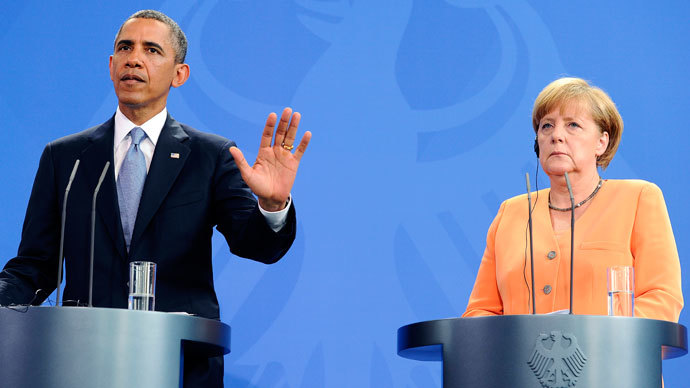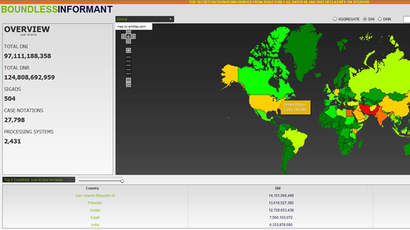Obama defends US snooping in uneasy Germany

US President Barack Obama has defended the actions of his government’s spying on Germany and its citizens on his Wednesday visit to the country, shortly after NSA revelations exposed that Germany was the US’s most spied upon European nation.
The codenamed ‘Prism’ operation instigated an outcry in a nation
which still remembers the East German secret ‘Stasi’ police
force.
“Yes We Scan” has been a popular headline across the
German press in the days preceding Obama’s visit. On the day of
his arrival in the country on Wednesday, Berlin witnessed a small
crowd campaigning against the NSA’s surveillance of foreign
communications, with people waving placards bearing the mocking
phrase.
“There has to be proportionality,” German Chancellor
Angela Merkel told a news conference on Wednesday. Merkel herself
grew up in the communist East. “The free democratic order is
based on people feeling safe,” she stated, while conceding
that on certain occasions, information needed collecting.
However, Merkel confessed surprise at the breath of spying that
was exposed, saying that the US must clarify exactly what data
was being collected and monitored.
Obama defended the US “encroachment on privacy” stating
that it had been limited by a US-court-approved process.
“This is not a situation where we are rifling through ordinary
emails of German citizens or American citizens or French citizens
or anyone else,” he said on his first visit to Berlin.
It had been revealed shortly before Obama’s visit that Germany
ranks as the most-spied-on EU country by the US, according to a
map of secret surveillance activities by the National Security
Agency (NSA).
“The questions are not yet resolved - and of course there are
those - which we will discuss,” stated Merkel. Obama tried to
reassure her that he was “confident that we can make the
necessary balance.”

Merkel’s accompanying statement that “the Internet is new
territory for all of us,” led to the phrase ‘Neuland’ going
viral on German-language Twitter, with several humorous and
cutting pictures being devised to accompany the phrase.
The reasons for Germany being subjected to the heightened US
surveillance measures are not fully known, but Obama claimed that
the US had eliminated 50 terrorist threats, which included among
them attacks on Germany, as a result of their spying program.
“Germany is geographically situated between East and West.
Historically it was always the case. On the other hand, Germany
is strong economically within Europe. There may be economic
reasons, not only protection from terrorists,” German
activist and theater director Angela Richter told RT earlier this
month.
The US has faced criticism from Merkel’s allies. Washington is
using "American-style Stasi methods," said Markus Ferber,
a member of Chancellor Angela Merkel's Bavarian sister party and
member of the European Parliament, at the point that the scandal
became more public.
Obama’s visit to Berlin fell on the anniversary of JFK’s “Ich
bin ein Berliner” speech. It was also his first time speaking
as President in Berlin, five years after he was running for the
position as a senator. The meeting of Obama and Merkel was held
at Berlin's iconic Brandenburg Gate, and their speeches were made
to some 4,000 invited spectators.
“I think people were disappointed – as you already mentioned,
five years ago there were 200,000 people listening to Obama and
this time there were 4,000 handpicked people, most likely mainly
American – that’s just, like, two percent of what he could gather
as a senator,” Frederik Roeder from European Students for
Liberty told RT’s Peter Oliver in Berlin.














